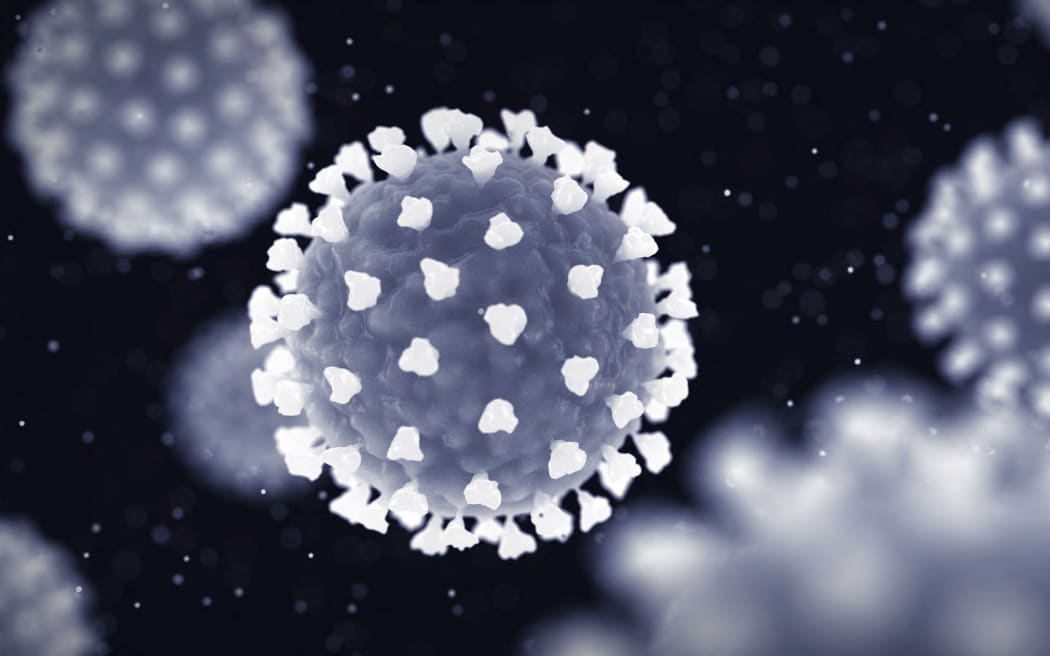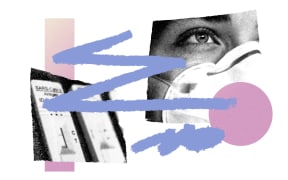
Dr John Gerrard said the description wrongly implied long-term post-Covid viral symptoms were "somehow unique and exceptional" to other viral infections, but new research suggested they were indistinguishable. Photo: NOBEASTSOFIERCE/SCIENCE PHOTO LI
The term "long Covid" should be scrapped, according to Queensland's chief health officer, because it creates unnecessary fear - and is "probably harmful".
Dr John Gerrard said the description wrongly implied long-term post-Covid viral symptoms were "somehow unique and exceptional" to other viral infections, but new research suggested they were indistinguishable.
The infectious disease physician said a Queensland study of more than 5000 people found similar rates of functional limitations in the daily lives of people a year after a Covid-19 infection, compared to seasonal flu and other respiratory illnesses.
Gerrard will present the results of the study next month at the European Congress of Clinical Microbiology and Infectious Diseases in Barcelona.
"We believe it's time to stop using the term long Covid," he said.
"[It] causes unnecessary fear. It implies that there is something particularly sinister and ominous about Covid-19.
"Our evidence suggests that there isn't, that it is not dissimilar to other viruses. That does not mean that you can't get these persistent symptoms following Covid-19, but you're no more likely to get it after Covid than with other respiratory viruses."
Queensland researchers compared 2399 adults who tested positive for Covid-19 with 995 influenza patients, and 1718 others who reported respiratory symptoms in mid-2022 but were negative for Covid-19 and the flu.
They surveyed the participants a year later, asking about ongoing symptoms and functional impairments using a questionnaire delivered by text message.
Gerrard said - after controlling for influential factors such as age, sex and First Nations status - the researchers found no evidence the Covid-19 patients were more likely to have ongoing symptoms or moderate to severe functional limitations, a year after their diagnosis, than the other participants.
After 12 months, 16 percent of respondents reported ongoing symptoms, regardless of whether they had Covid-19, the flu, or another respiratory infection.
The survey also found three percent of the Covid-19 patients said they had moderate to severe functional impairment - compared with 4.1 percent of the non-Covid participants.
Long Covid 'does exist'
Gerrard said 94 percent of participants who reported the moderate to severe level of functional limitations experienced fatigue, post-exertion symptom exacerbation, brain fog and changes to taste and smell a year after their infection.
The rates were similar regardless of whether the person had tested positive to Covid-19 or not.
Given the study results, Gerrard described long Covid as "probably a harmful term", given its potential to make some people hypervigilant to symptoms in the months after their infection, which could be detrimental to recovery.
However, he stressed he was not questioning the validity of long Covid.
"Post-viral syndromes do occur. We're absolutely saying that it does exist," Gerrard said.
"We see it with Ross River virus. Clearly, we see it with influenza as well.
"A severe viral infection can be quite a significant inflammatory insult and, in some people, that clearly can cause persistent symptoms. But in the vast majority of people, recovery is the norm."
Study builds on prior Queensland research
The latest study builds on Queensland Health research, published in the British Medical Journal last year, that found no difference between Covid-19 and influenza symptoms three months on from infection.
Gerrard said limitations of the Queensland research included that participants who had pre-existing illnesses were unable to be identified in the study.
He also said the risk of so-called long Covid in Queensland was lower during the Omicron waves, compared with other variants as 90 percent of the state's population was vaccinated when Omicron emerged.
"We may well have found a different result in an unimmunised population, prior to the arrival of the Omicron variant," Gerrard said.
"What they described in the UK with long Covid in the early days, we know their experience of Covid was completely different to our experience.
"It's quite possible their experience of long Covid is different to ours here in Queensland."
Gerrard said the researchers sent text messages to more than 30,000 Queenslanders last year as part of the study, about 6400 people responded and some of those were deemed ineligible because they didn't have respiratory symptoms at the time of the initial test.
He said Queensland Health planned to do more research into other complications following Covid-19 infection - compared to other viruses - including strokes, heart attacks and myocarditis - an inflammation of the heart muscle.
"Somewhere between 4 and 5 million Queenslanders have caught Covid-19 over the last couple of years, so even a very small complication rate translates to a significant number of people when you have so many people infected," Gerrard said.
More long Covid clinics needed
Mater infectious diseases director Dr Paul Griffin, who was not involved in the study, cautiously welcomed the findings but said much more research was needed to better understand long Covid.
"We should be looking at much larger samples and collaborating with people in other locations," Griffin said.
He said the sheer volume of Queenslanders who had been infected with Covid-19 supported the need for public long Covid clinics.
"I do think long Covid clinics would be worthwhile," he said.
"I think investing in some guidelines for how practitioners can help long Covid patients, and then bringing together appropriate expertise into long Covid clinics for those that require it would… be really helpful for those people that are suffering the worst.
"We need to be able to identify who's at highest risk and ideally, work out ways to prevent it and treat it if people do get it. All of those areas are sadly lacking."
This article was originally published by ABC.






